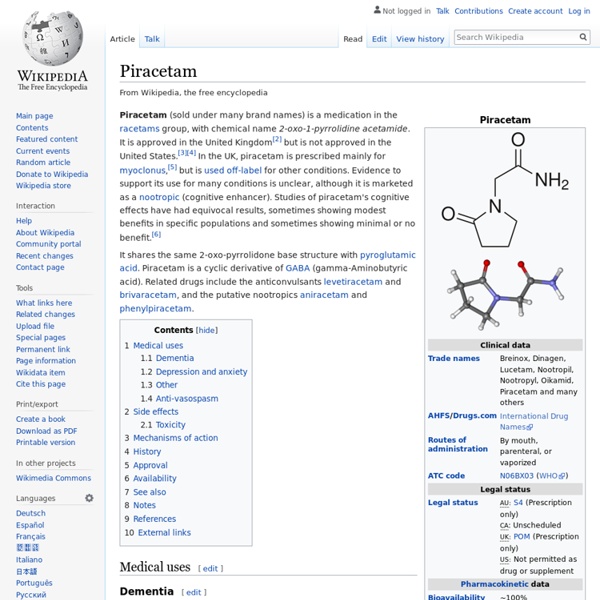Nootropic
Nootropics (/noʊ.əˈtrɒpɨks/ noh-ə-TROP-iks), also referred to as smart drugs, memory enhancers, neuro enhancers, cognitive enhancers, and intelligence enhancers, are drugs, supplements, nutraceuticals, and functional foods that improve one or more aspects of mental function, such as working memory, motivation, and attention.[1][2] The word nootropic was coined in 1972 by the Romanian Dr. Corneliu E. Giurgea,[3][4] derived from the Greek words νους nous, or "mind", and τρέπειν trepein meaning to bend or turn.[5] Availability and prevalence[edit] At present, there are only a few drugs which have been shown to improve some aspect of cognition in medical reviews.[citation needed] Many more are in different stages of development.[6] The most commonly used class of drug is stimulants, such as caffeine.[7] Academic use[edit] Surveys suggest that 3–11% of American students and 0.7–4.5% of German students have used cognitive enhancers in their lifetime.[11][12][13] Side effects[edit] Drugs[edit]
Born to Learn ~ You are Born to Learn
What Is the Memory Capacity of the Human Brain?
Can an old head injury suddenly cause detrimental effects much later in life? —Anonymous, via e-mail Douglas Smith, professor of neurosurgery and director of the Center for Brain Injury and Repair at the University of Pennsylvania, answers: ALTHOUGH A BRAIN INJURY from a car accident or a collision during a football game often seems to cause a sudden change to cognitive ability years later, this change does not just appear out of the blue—the damage has been building up slowly, unnoticed, over time. Postinjury, the progressive brain deterioration that may occur likely reaches a tipping point, after which the loss of function “suddenly” becomes obvious. TBI commonly damages nerve fibers in the brain called axons. In addition, with axons disappearing or not functioning well after TBI, a person’s ability to process new information may slow down. Most people with TBI will have progressive axonal damage, but it is difficult to predict who will suffer from cognitive changes years later. "MR.
Researchers create car that can be steered by thought
The case for outlawing the practice of talking on cell phones while driving got a boost from the latest breakthrough from the innovation labs of Freie Universität Berlin. German scientists working there have installed a car with new technology that can read the driver's brain waves, thus allowing the car to be steered entirely by thought, reports Science Daily. Needless to say, you probably don't want to be distracted while driving this vehicle. The technology is made possible by commercially available sensors for recording electroencephalograms (EEGs), which are basically the electrical outputs your brain produces while it thinks. Scientists then trained a computer program to distinguish the particular electrical patterns that are produced when a person thinks certain commands, such as "left," "right," "accelerate" or "brake." Once the training was complete, it was time to take it out for a spin in the real world. Also on MNN:
THE ECONOMICS OF HIGH-END PROSTITUTES
PLASTIC FLOWERS AND MAWKISH SENTIMENTALITY | April 17th 2008 Lee Jordan/flickr The BBC is a national institution, supported by public funds. It has a duty to deliver public-service information. So what's with all the soft news and sentimental clichés? Special to MORE INTELLIGENT LIFE Last Sunday wasn't the most eventful one in world history. So what does the British Broadcasting Corporation pick on to lead its evening television news? Minute after minute--four or five, I'd guess, in a 20-minute bulletin--the report drags on, complete with (justifiably) sorrowing parents, the usual tributes (equally justified, let us trust) and the plastered-on solemnity of journalistic grief in which the BBC is now so expert. And this is the editorial judgment of a once-serious broadcasting organisation, still the premier news-gatherer in the land! If all this were an aberration on a news-thin Sunday, it wouldn't deserve comment. Still, the BBC is a national institution, supported by public funds.
Unexcited? There May Be a Pill for That
The pills were either a placebo or a new drug called Lybrido, created to stoke sexual desire in women. Checking her computer, Miller pointed out gently that Linneah hadn’t been doing her duty as a study participant. Over the past eight weeks, she took the tablets before she planned to have sex, and for every time she put a pill on her tongue, she was supposed to make an entry in her online diary about her level of lust. “I know, I know,” Linneah said. Miller, a study coordinator, began a short interview, typing Linneah’s replies into a database that the medication’s Dutch inventor, Adriaan Tuiten, will present to the Food and Drug Administration this summer or fall as part of his campaign to win the agency’s approval and begin marketing what might become the first female-desire drug in America. “Low.” “When your partner initiated sexual activity over the past eight weeks, did you show avoidance behavior?” “Yes.” “Like earlier to bed?” “Yes.” Jake Chessum for The New York Times
:: Authentic Happiness :: Using the new Positive Psychology



